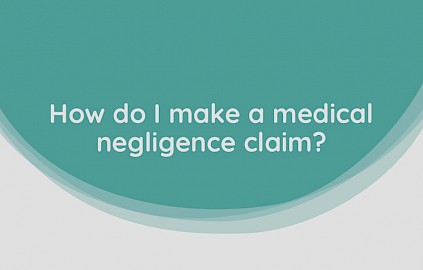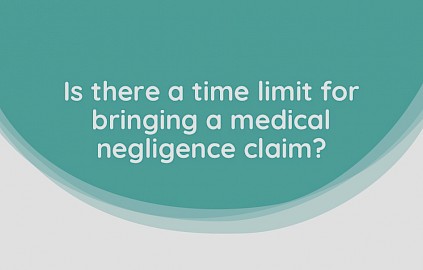If you feel you have a detached retina claim as a result of negligent medical treatment, please don’t hesitate to speak with our specialist medical negligence solicitors. This is a serious medical negligence claim and we will work closely with you to ensure you are rewarded with the compensation you deserve, leaving no stone unturned.
We have acted in various of these cases in the past. Currently, we are at an advanced stage in a case valued at £2.1 million in which, after delayed diagnosis of retinal detachment, vitrectomy surgery failed to save the vision in our client's eye, even after reattaching the retina. This has left our client with significant difficulties in terms of her daily living as well as her being vulnerable with regards to the condition of her right eye.
About Retinal Detachment Claims
Do I have a retinal detachment claim?
You may be able to seek retinal detachment compensation if your doctor failed to diagnose the detachment in time. This is because the length of time between detachment and treatment is key to your chances of recovery. With late diagnosis, the tear can worsen and your prospects of recovery can reduce.
In August 2019, the National Institute for Health and Care Excellence (NICE) revised national guidance for retinal detachment:
- If a patient has new-onset flashes, with or without floaters and there are concerns about detachment, there should be specialist assessment most urgently.
- Immediately arrange for a specialist ophthalmologist to examine on the same day. This should be done if eyesight is impaired (visual field loss or reduced clarity of vision).
- Urgent referral for examination within 24 hours if there is no impairment as described above and no clinical signs of a detached retina.
- Other advice should be given about driving and looking out for further warning signs.
If retinal detachment isn’t treated quickly, this can increase the likelihood of sight loss. In this case, you may have a loss of sight claim.
Is there a time limit for retinal detachment claims?
The time limit for retinal detachment claims is three years from either the date of the treatment that caused you to seek advice, or the date upon which you realised the treatment could have been negligent. Three years is the time limit for all medical negligence claims. However, there are exceptions to the limitation period, so please don’t hesitate to contact us even if you’re concerned about dates and deadlines.
What retinal detachment compensation could I receive?
If a retinal detachment has been missed or diagnosed too late by a medical professional, then you may experience temporary or permanent loss of sight. Understandably, this is extremely distressing and will have a significant impact on your life. You may be able to claim compensation for:
- Pain, suffering and loss of amenity – For the pain and suffering the negligent treatment caused, and the consequent impact this has on your enjoyment of life.
- Time off work – With a detached retina, you will likely need to take time off work. This may be a substantial amount of time. You may even need to find a new type of employment or stop working all together. As a result, you could be eligible for compensation to cover financial losses (both past and future).
- Adapting your home and lifestyle – Damage to your sight, whether temporary or permanent, will require you to make adaptations. You may need to adapt your home for better navigation and you won’t be able to drive.
- Additional treatment – As a result of your injury, you may need additional medical treatment, specialist care, therapy and expenses to cover any travel these appointments incur.
This list is not exhaustive and the amount of compensation you could claim is calculated on a case-by-case basis. It’s important to instruct experienced medical negligence solicitors to examine every layer of your case and ensure you are claiming a fair amount.
About Retinal Detachment
What does retinal detachment mean?
Retinal detachment occurs when the lining of the back of the eye (retina) separates from the “RPE” (a layer of cells with key functions including transporting nutrients to the nerve tissue of the retina, transporting molecules in and out, removing waste products from the retina, and protecting the retina from excessive high-energy light). If left untreated, without nourishment and oxygen, the nerves in the eye can die and lead to blindness. Typically, retinal detachment only occurs in one eye.
What is the most common cause of retinal detachment?
The most common cause of retinal detachment is degeneration of the retina with age. As the retina becomes weaker and thinner, liquid can move into the space between the retina and the RPE and force the membranes apart.
However, age is not the only risk factor. People who suffer from severe short-sightedness (technical term - “myopia”) are at an increased risk of developing retinal detachment. People who have recently undergone cataract surgery or suffered an injury to the eye also have a higher chance of developing the condition.
If you have any of the signs or symptoms of retinal detachment, it’s important to discuss this with your doctor as soon as possible. The sooner a diagnosis can be made, the better the chance at saving vision in the eye.
What are the types of retinal detachment?
- Tear / hole in the retina (rhegmatogenous retinal detachment): As you age, you may experience posterior viterous detachment (PVD), where the vitreous gel (the gel-like fluid that fills your eye) naturally comes away from the retina. This is common, and usually PVD happens gently so you don't notice it. However, in some cases it can cause a tear. When there is a tear in the retina, fluid can leak between the retinal layers and, as a result, the retina lifts away and detaches.
- Scar tissue on the retina (tractional retinal detachment): If scar tissue builds up on your retina, it can pull the retina away from the back of the eye. You are more at risk of tractional retinal detachment if you have severe diabetic retinopathy.
- Fluid collecting under the retina (exudative retinal detachment): This is a rare type of retinal detachment, and happens when there is a build up of fluid behind your retina without any tears or holes. If the fluid builds up, it can push the retina away from the back of the eye. Exudative retinal detachment can be caused by an eye injury, eye swelling, tumors and inflammatory diseases.
How long does it take to go blind from retinal detachment?
After the retina has detached, you can experience complete vision loss within a matter of days. This is why it is imperative that there is no delay in diagnosis.
What are the symptoms of a detached retina?
Unlike most conditions, there is no pain associated with retinal detachment but you will start to notice changes in your vision. If you notice any of these symptoms, you should see a medical professional immediately.
-
Sudden change and increase in number of “floaters” – In the early stages of a detachment of the retina, you may notice an increased number of “floaters” in your vision. Floaters are the odd little dots and lines which appear in your vision, most noticeable when looking at something against a light background. Floaters are caused by harmless debris floating around inside the jelly-like substance that fills the eye. Ordinarily, floaters are harmless and do not affect vision. However, a sudden change and increase in the numbers of floaters in your vision can be an early sign of retinal detachment and any significant changes in our vision should be reported to your doctor.
-
Sudden flashes of light – It is common with retinal detachment to experience sudden flashing lights or spreading of dark spots at the edge of your vision, causing a blurring affect. Consult a doctor immediately if you begin to experience any reduction in your vision.
-
Sudden deterioration in vision – Once the retina detaches, you will normally experience a sudden deterioration in your vision. This may be in the form of blurring or by the onset of large dark shadows across your vision.
Spotting the symptoms in others can sometimes be difficult. Children or vulnerable adults who may not be able to communicate the changes in vision which they are experiencing can find the vision changes scary and upsetting. Discussing eyesight regularly and monitoring behaviour for early warning signs may help others who may not find it as easy to help themselves.
How is a detached retina diagnosed?
If your doctor suspects retinal detachment, they will normally perform a simple retinal examination to look at the back of the eye. If a lit lamp exam can’t get a good enough view of the back of your eye, then your doctor may perform an ultrasound on your retina. This is a very quick and painless test using a small scanner. This is similar to the ones at your normal optician appointments.
If the signs of retinal detachment are there, your doctor will refer you for treatment to re-attach the retina.
What are the treatment options for a detached retina?
Treatment options vary depending on your own condition, the severity of the tear, and the length of time which has passed since the detachment began.
-
Vitrectomy – The surgeon will make tiny openings in the eye and remove the vitreous or clear gel from the back of the eye and replace it with a gas bubble or silicone oil bubble to hold the retina in place while it heals. The tear in the retina is treated with laser (light) or cryotherapy (freezing).
-
Scleral buckle surgery – This is where a soft, flexible band is stitched to the surface of the sclera or white of the eye. This causes the sclera to ‘buckle’ inwards slightly and pushes the RPE on the inside of the eye against the detached retina. Cryotherapy or freezing is used to cause scar tissue allowing the retina to reattach to the RPE around each tear.
-
Pneumatic retinopexy – Where the detachment is a small area, this procedure may be used. The surgeon will inject a small gas bubble at the site of the detachment without removing any vitreous or gel. The bubble presses the retina into place. Cryotherapy is used to repair the retinal break.
Each type of eye surgery carries its own risks and prospects of success, but provided the detachment is diagnosed and treated quickly enough, the risks of complications are reduced and the chances of making a full recovery are better.
Contact Retinal Detachment Compensation Solicitors
If you have been the victim of medical negligence, our specialist team can help you through the process of getting retinal detachment compensation. We have extensive experience in retinal detachment cases - for example, we helped our client win his case after being misdiagnosed, despite presenting symptoms of retinal detachment, and suffering permanent sight reduction in his left eye due to delayed surgical repair.
If you’ve had any problems relating to your treatment, please contact our friendly team today for a free chat about your options. We offer ‘No Win No Fee’ agreements for the majority of our cases, so you have nothing to lose financially from chatting with us about your potential claim.
If you have experienced vision impairment, please take a look at our detailed loss of sight resource guide with practical next steps and contact information for support groups.
Please Note: At Medical Solicitors, we specialise in retinal detachment claims concerning healthcare providers in England and Wales and will be happy to extend a helping hand if your case is based in either of these regions. Unfortunately, we do not handle retinal detachment claims outside of England and Wales.








